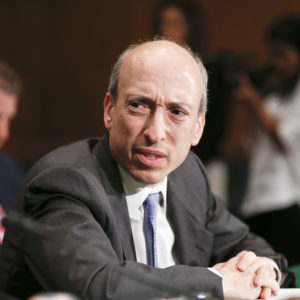“You’re going to have the most pro-crypto president in the history of America,” Eric Trump declared at the Bitcoin MENA conference on Dec. 10, as he discussed Donald Trump’s anticipated crypto policy.
Crypto industry leaders and advocates welcomed the potential change after a grueling four-year war with Securities and Exchange Commission Chair Gary Gensler.
Gensler, who resigned last month, badgered crypto companies with multiple lawsuits and controversial enforcement actions. He routinely allied with Sen. Elizabeth Warren, D-Mass., on crypto skepticism and regulatory issues.
Crypto enthusiasts accused Gensler of launching “Operation Chokepoint 2.0,” a campaign using litigation to achieve what could not be accomplished through regulation or legislation. The effort was modeled after the Obama-era Operation Chokepoint, which targeted gun dealers, payday lenders and sex workers.
“Gensler’s SEC was too quick to condemn new technology and financial products … and unwilling to offer simple guidance that would have given more clarity to consumers and investors,” said Yaël Ossowski, deputy director at the Consumer Choice Center and a fellow at the Bitcoin Policy Institute.
The SEC’s version of Operation Chokehold encountered legal headaches almost immediately.
A federal judge dismissed Gensler’s attempt to classify Ripple’s XRP token as a security and denied the SEC’s appeal. A separate panel of judges criticized the SEC for its capricious and inconsistent policy of denying Grayscale’s proposed Bitcoin exchange-traded program after previously approving two others.
A significant setback occurred in 2023 when a federal judge threatened to sanction SEC attorneys for “materially false and misleading representations” in a suit against Wyoming-based crypto firm Digital Licensing Inc., also known as DEBT BOX. The SEC later dropped the suit.
Gensler refused to back down on crypto enforcement. Less than two weeks after his resignation, the SEC requested that a federal judge not dismiss its suit against Binance and 10 other crypto asset issuers. “The issuers of the Ten Crypto Assets and Defendants treated the offer and sale of these assets as investments whose success inured to the investors’ financial benefit — and publicly promoted them as such,” SEC attorneys alleged in court documents.
Trump has nominated former SEC Commissioner Paul Atkins as Gensler’s replacement, pending approval from the Senate. He named entrepreneur David Sacks as his White House AI and Crypto Czar to work on the crypto legal framework. Both are crypto supporters. Atkins has been a policy adviser to The Digital Chamber, a pro-crypto advocacy group. Sacks invested in crypto companies through his Craft Ventures fund.
Noted crypto and financial tech advocate Jimmie Lenz of Duke University’s Pratt School of Engineering said the appointments signal Trump is serious about advancing America’s tech role. “The administration is likely to support innovation, thus new technologies and new ideas are likely to be encouraged,” he said.
Ripple CEO Brad Garlinghouse praised the pair, calling them a Dream team. He said Atkins would bring common sense policy to the SEC. As for Sacks, Garlinghouse said he would promote pro-innovation plans.
This has alarmed Warren, who is expected to be the top Democrat on the Banking Committee. She expressed concern over Atkins, calling him a Wall Street lobbyist who opposed “fines against the giant corporations that defrauded investors” during the 2009 financial crisis.
The potential new regulatory environment has Ossowski excited about the future of Bitcoin and other crypto assets.
“If the U.S. truly becomes a Bitcoin and crypto powerhouse with a more receptive administration, it will be a beacon to the rest of the world that Bitcoin and its crypto-offspring are vital tools for democratizing financial inclusion and consumer innovation for the future,” he said.
Eric Trump framed it in grander terms: Donald Trump “is going to make America the Bitcoin capital of the world,” he said.





